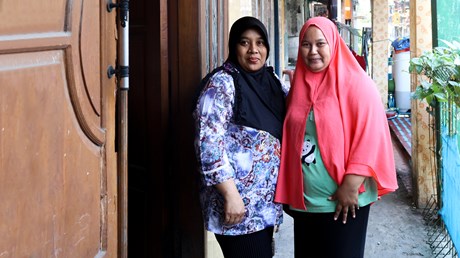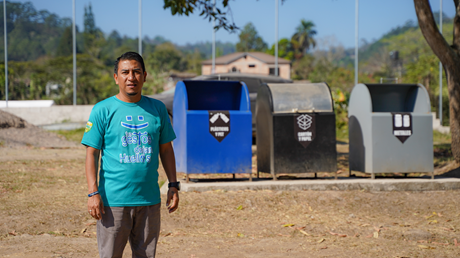Search Results for garbage
Articles
What The Bible Says Good Samaritan's Penny Pulpit by Pastor Ed Rice
|
Videos
News
Indonesia's Compassion First isn't knocking down doors, but caring for victims and tutoring at-risk youth living in cemeteries.
 Inside a cemetery in West Java, a woman rests on a mattress laid on top of a gravestone beneath the oak trees. The graveyard is home not only to the dead but to the living poor, who have nowhere else to go.Residents of the Rose Cemetery community collect garbage, drive pedicabs, or clean graves by day. In the northern section of the cemetery, about 200 families live in brick and tin buildings lining a ditch filled with trash and milky sewage water. At night, many women resort to prostitution to provide for their families. Their daughters are often sold—or kidnapped—into the sex trade. (CT changed the names of the cemeteries and only used the first names of its residents for security reasons.)Compassion First (CF) offered tutoring, parenting classes, and cooking classes for the community on a blue covered porch in the cemetery complex. Recently they moved to a new community center nearby. CF focuses on fighting sex trafficking in Indonesia, and here at the cemetery, that means community development among families vulnerable to exploitation.Susi and Mala, two mothers who have lived in the community their whole lives, noted that neighbors rarely knew one another in the past. CF arrived during the COVID-19 pandemic—initially to provide food for the community and scholarships to the children. Since then, the neighborhood has become much more close-knit and better resourced. For young girls, this could make the difference between whether they are trafficked or not.Susi learned from the cooking class how to make seblak (a spicy dish made of wet crackers and meat or seafood, smothered in sambal chili paste) and now sells it to supplement her income. Mala learned about the five love languages in the parenting class ...Continue reading... Inside a cemetery in West Java, a woman rests on a mattress laid on top of a gravestone beneath the oak trees. The graveyard is home not only to the dead but to the living poor, who have nowhere else to go.Residents of the Rose Cemetery community collect garbage, drive pedicabs, or clean graves by day. In the northern section of the cemetery, about 200 families live in brick and tin buildings lining a ditch filled with trash and milky sewage water. At night, many women resort to prostitution to provide for their families. Their daughters are often sold—or kidnapped—into the sex trade. (CT changed the names of the cemeteries and only used the first names of its residents for security reasons.)Compassion First (CF) offered tutoring, parenting classes, and cooking classes for the community on a blue covered porch in the cemetery complex. Recently they moved to a new community center nearby. CF focuses on fighting sex trafficking in Indonesia, and here at the cemetery, that means community development among families vulnerable to exploitation.Susi and Mala, two mothers who have lived in the community their whole lives, noted that neighbors rarely knew one another in the past. CF arrived during the COVID-19 pandemic—initially to provide food for the community and scholarships to the children. Since then, the neighborhood has become much more close-knit and better resourced. For young girls, this could make the difference between whether they are trafficked or not.Susi learned from the cooking class how to make seblak (a spicy dish made of wet crackers and meat or seafood, smothered in sambal chili paste) and now sells it to supplement her income. Mala learned about the five love languages in the parenting class ...Continue reading... |
A Honduran church leads the way in local garbage collection while praying for an international plastics treaty.
 A banner hangs outside the Church of God in the village of El Rincón, Honduras, that says, “Let’s be part of the solution, not the pollution.”It’s a message pastor Wilfredo Vásquez posted after witnessing the harmful effects of plastics in his community.“More and more, I understand that if we want to see changes in any area of society, we as children of God must take the initiative for those changes, because the church is the hope of the world,” he told CT.Vásquez, who shepherds the Wesleyan-Arminian congregation in the Central American town of about 4,000 people, has started taking steps to help his community and hopes world leaders will do the same by establishing an international treaty on plastics.From April 23 to 29, delegates from around the world met in Ottawa for the United Nations’ Intergovernmental Negotiating Committee on Plastic Pollution (INC-4). It’s the fourth stage in a five-stage process working toward an agreement that has the potential to change how plastic is handled globally.If passed, experts believe it could have a similar impact on plastic usage as the Montreal Protocol of 1987 had on chemicals such as freon.While the final stage of the process isn’t until November in South Korea, after the most recent round of discussions in Canada, delegates from more than 150 countries agreed to begin intercessional work. Right away, delegates will start meeting to develop ways to identify plastic products and chemicals of concern.In El Rincón, 3,600 miles away from the latest round of discussions, Vásquez is praying for the treaty’s passage.Vásquez knows exactly what’s at stake and what a difference even ...Continue reading... A banner hangs outside the Church of God in the village of El Rincón, Honduras, that says, “Let’s be part of the solution, not the pollution.”It’s a message pastor Wilfredo Vásquez posted after witnessing the harmful effects of plastics in his community.“More and more, I understand that if we want to see changes in any area of society, we as children of God must take the initiative for those changes, because the church is the hope of the world,” he told CT.Vásquez, who shepherds the Wesleyan-Arminian congregation in the Central American town of about 4,000 people, has started taking steps to help his community and hopes world leaders will do the same by establishing an international treaty on plastics.From April 23 to 29, delegates from around the world met in Ottawa for the United Nations’ Intergovernmental Negotiating Committee on Plastic Pollution (INC-4). It’s the fourth stage in a five-stage process working toward an agreement that has the potential to change how plastic is handled globally.If passed, experts believe it could have a similar impact on plastic usage as the Montreal Protocol of 1987 had on chemicals such as freon.While the final stage of the process isn’t until November in South Korea, after the most recent round of discussions in Canada, delegates from more than 150 countries agreed to begin intercessional work. Right away, delegates will start meeting to develop ways to identify plastic products and chemicals of concern.In El Rincón, 3,600 miles away from the latest round of discussions, Vásquez is praying for the treaty’s passage.Vásquez knows exactly what’s at stake and what a difference even ...Continue reading... |
A Honduran church leads the way in local garbage collection while praying for an international plastics treaty.
 A banner hangs outside the Church of God in the village of El Rincón, Honduras, that says, “Let’s be part of the solution, not the pollution.”It’s a message pastor Wilfredo Vásquez posted after witnessing the harmful effects of plastics in his community.“More and more, I understand that if we want to see changes in any area of society, we as children of God must take the initiative for those changes, because the church is the hope of the world,” he told CT.Vásquez, who shepherds the Wesleyan-Arminian congregation in the Central American town of about 4,000 people, has started taking steps to help his community and hopes world leaders will do the same by establishing an international treaty on plastics.From April 23 to 29, delegates from around the world met in Ottawa for the United Nations’ Intergovernmental Negotiating Committee on Plastic Pollution (INC-4). It’s the fourth stage in a five-stage process working toward an agreement that has the potential to change how plastic is handled globally.If passed, experts believe it could have a similar impact on plastic usage as the Montreal Protocol of 1987 had on chemicals such as freon.While the final stage of the process isn’t until November in South Korea, after the most recent round of discussions in Canada, delegates from more than 150 countries agreed to begin intercessional work. Right away, delegates will start meeting to develop ways to identify plastic products and chemicals of concern.In El Rincón, 3,600 miles away from the latest round of discussions, Vásquez is praying for the treaty’s passage.Vásquez knows exactly what’s at stake and what a difference even ...Continue reading... A banner hangs outside the Church of God in the village of El Rincón, Honduras, that says, “Let’s be part of the solution, not the pollution.”It’s a message pastor Wilfredo Vásquez posted after witnessing the harmful effects of plastics in his community.“More and more, I understand that if we want to see changes in any area of society, we as children of God must take the initiative for those changes, because the church is the hope of the world,” he told CT.Vásquez, who shepherds the Wesleyan-Arminian congregation in the Central American town of about 4,000 people, has started taking steps to help his community and hopes world leaders will do the same by establishing an international treaty on plastics.From April 23 to 29, delegates from around the world met in Ottawa for the United Nations’ Intergovernmental Negotiating Committee on Plastic Pollution (INC-4). It’s the fourth stage in a five-stage process working toward an agreement that has the potential to change how plastic is handled globally.If passed, experts believe it could have a similar impact on plastic usage as the Montreal Protocol of 1987 had on chemicals such as freon.While the final stage of the process isn’t until November in South Korea, after the most recent round of discussions in Canada, delegates from more than 150 countries agreed to begin intercessional work. Right away, delegates will start meeting to develop ways to identify plastic products and chemicals of concern.In El Rincón, 3,600 miles away from the latest round of discussions, Vásquez is praying for the treaty’s passage.Vásquez knows exactly what’s at stake and what a difference even ...Continue reading... |
How did all this garbage – pure Sustainable Development, aka Technocracy – show up in our cities and states? Answer: a full-court barrage of UN...How Did States, Cities Embrace UN's “2030 Agenda” Climate Action Plans?
|
How did all this garbage – pure Sustainable Development, aka Technocracy – show up in our cities and states? Answer: a full-court barrage of UN...How Did States, Cities Embrace UN's “2030 Agenda” Climate Action Plans?
|



 Links
Links  Articles
Articles  Blogs
Blogs  Videos
Videos  News
News  Colors
Colors 

 New links
New links






